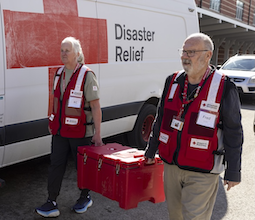Leon Russell still remembers those four-hour drives from his small hometown to the University of Virginia Hospital in Charlottesville during the late 1950s and early 60s. His brother Amos was having another sickle cell crisis, and getting care meant navigating segregated facilities—carefully planning where a Black family in crisis would be welcome.
In those days, the Russell family was fighting more than systems of oppression. They were fighting an unpredictable disease that would profoundly impact his two younger brothers' lives—experiences that would shape Leon's lifelong dedication to fighting for human rights and his work with the NAACP, a civil rights organization founded in 1909 that is focused on community well-being.
A Family's Journey
Leon's brothers, Amos and Phyllis Jerome, were both born with sickle cell disease, the most common genetic blood disorder in the U.S. The disease distorts soft and round red blood cells and turns them hard and crescent shaped. As a result, blood has difficulty flowing smoothly and carrying oxygen to the rest of the body, which may lead to severe pain, tissue and organ damage, anemia, and even strokes.
"We knew from early childhood and many visits to medical facilities that they had sickle cell," said Leon, Chairman of the NAACP National Board of Directors. "They suffered sickle cell crises on and off."
For Amos and Phyllis Jerome, blood transfusions became a lifeline. Leon watched as donated blood would pull his brothers back from the brink, crisis after crisis. His brother Amos made it to his mid-twenties. Then came the call no older brother should receive.
"He had a crisis. He went into the hospital, and I got a call from the doctor that said, 'That wasn't supposed to happen,'" Leon recalled. "And I said, 'What wasn't supposed to happen?' He developed a blood clot during a crisis, that went to his heart and killed him."
Phyllis Jerome lived longer, into his late thirties, but he too succumbed to the disease during a crisis.
From Pain to Purpose
When Leon rolled up his sleeve to donate blood recently at the NAACP National Convention in Charlotte, N.C.–to him it was much more than giving one pint of blood. It was about the impact his brothers' journeys with sickle cell made on him and his desire to honor them by championing change for patients living with the disease.
The need for blood is constant. According to the CDC, sickle cell disease affects one in every 365 African American newborns, with many patients requiring blood transfusions throughout their lifetime. About every two and a half minutes, someone with sickle cell disease arrives at a U.S. emergency room—and nearly two out of three times, they're in severe pain.
Blood donors who are Black are almost three times more likely to be a match for these patients compared to other donors—making their participation critical. Whether supporting routine transfusions or advanced treatments like stem cell and gene therapy, closely matched blood donations are essential for many patients.
"Even though we're seeing advancements in the treatment protocols, it's important for us to understand that blood is still a preeminent kind of form of treatment for the disease," Leon shared.
That is why the national partnership between the NAACP and the American Red Cross matters. To date, the NAACP and Red Cross have hosted over 165 blood drives in support of patients with sickle cell disease. NAACP branches across the country are hosting blood drives during the fall "Joined by Blood" activation, helping expand blood donation opportunities in Black communities and to grow the number of blood donors who are Black to help sickle cell warriors.
Today, Leon honors Amos and Phyllis Jerome by working to ensure fewer families experience the pain of losing loved ones to sickle cell disease. Join him by scheduling a blood donation appointment today! Visit RedCrossBlood.org/OurBlood, download the Red Cross Blood Donor App, or call 1-800-RED CROSS (1-800-733-2767). When our communities give together, we heal together.














